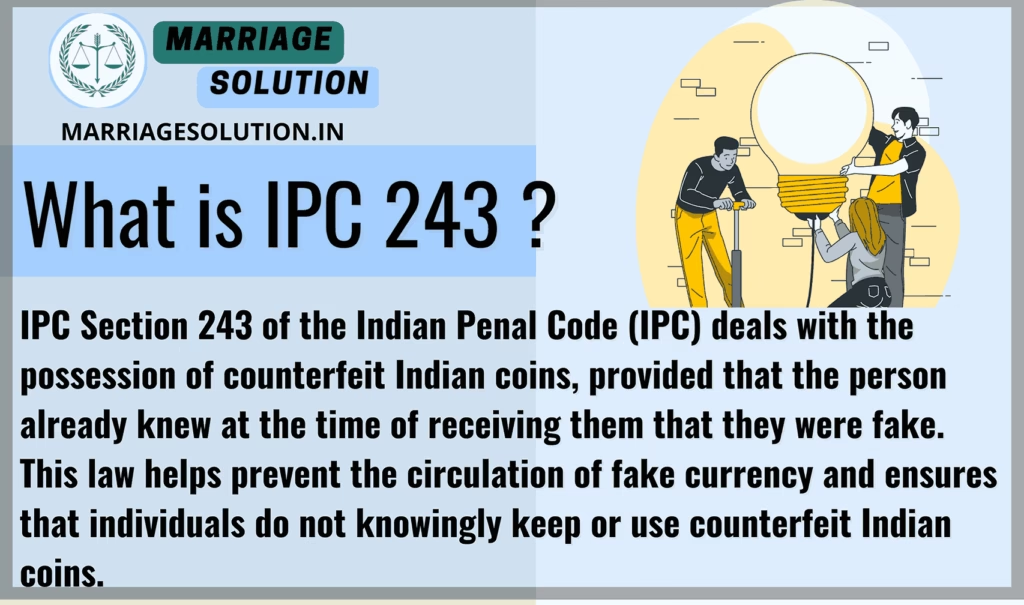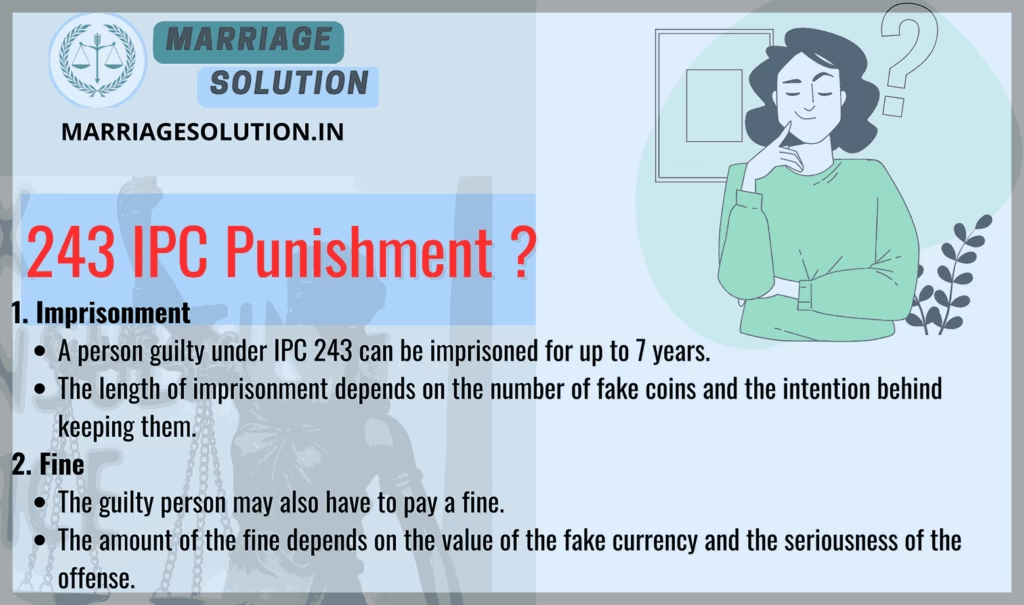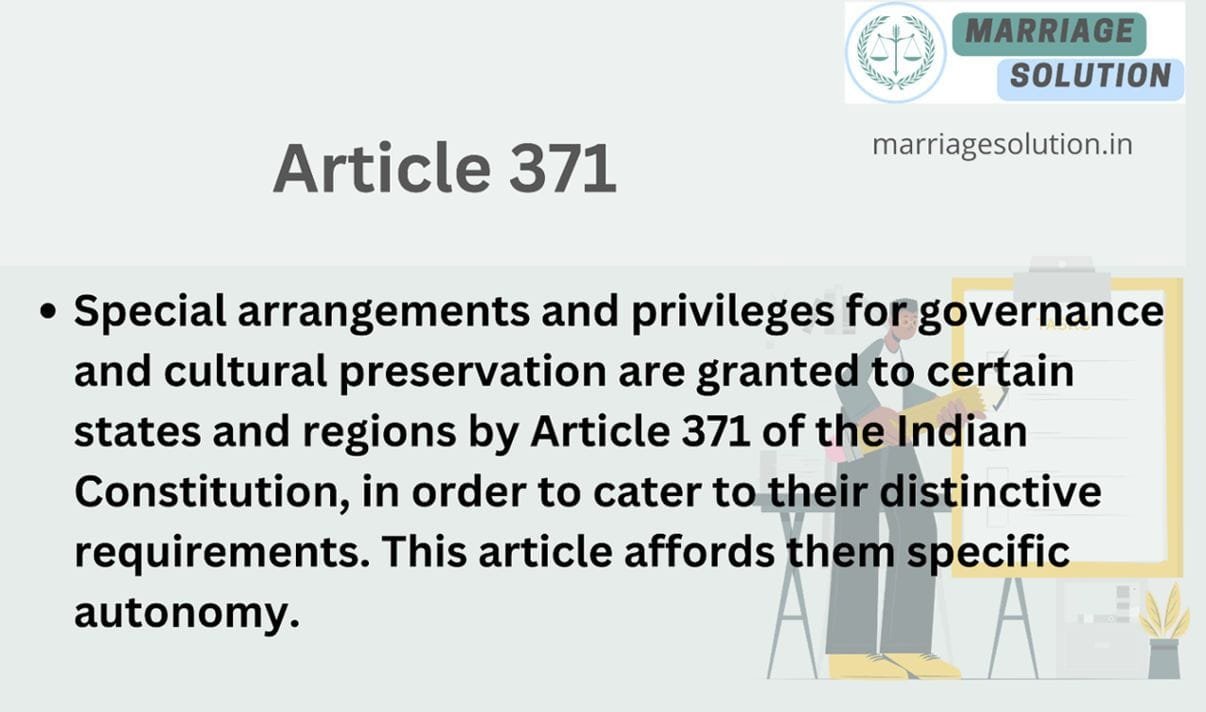Introduction of Section 243 IPC
Section 243 IPC deals with situations where a person knowingly keeps a counterfeit Indian coin in their possession. Even if the person did not create or distribute the fake coin, simply holding onto it while knowing it is fake is a crime. The law ensures that fake currency does not spread in the economy and punishes those who help in circulating it.
- Introduction of Section 243 IPC
- What is IPC Section 243 ?
- Section 243 IPC in Simple Points
- Section 243 IPC Overview
- 10 Key Points of IPC 243
- 1. Understanding the Crime
- 2. Importance of Awareness
- 3. Purpose of the Law
- 4. Difference Between IPC 242 and IPC 243
- 5. Connection to Economic Security
- 6. Punishment for the Offense
- 7. Bailability and Cognizability
- 8. No Requirement for Circulation
- 9. Proof of Knowledge is Crucial
- 10. Role of Law Enforcement
- Example 1: Shopkeeper Found with Fake ₹10 Coins
- Example 2: Fake ₹5 Coins in a Bank Deposit
- Section 243 IPC case laws
- 243 IPC Punishment
- 243 IPC Bailable or non bailable
- Section 243 IPC in short information
- IPC Section 243 FAQs
- If you need support with court proceedings or any other legal matters, don’t hesitate to reach out for assistance.
What is IPC Section 243 ?
IPC Section 243 of the Indian Penal Code (IPC) deals with the possession of counterfeit Indian coins, provided that the person already knew at the time of receiving them that they were fake. This law helps prevent the circulation of fake currency and ensures that individuals do not knowingly keep or use counterfeit Indian coins.

Section 243 IPC in Simple Points
1. Crime of Knowing Possession
A person is guilty under IPC 243 if they possess a fake Indian coin while knowing at the time of receiving it that it was counterfeit. If someone gets a fake coin without knowing and later discovers it, this section does not apply to them.
2. Intention Does Not Matter
Even if the person does not use or distribute the fake coin, just keeping it knowingly is a punishable offense. The law does not require proof that the person tried to cheat or deceive others. The act of knowingly possessing it is enough for punishment.
3. Seriousness of the Crime
Counterfeit currency can cause serious harm to the economy. IPC 243 prevents fake coins from spreading in the market, protecting genuine currency value and public trust. This is why strict punishment is given to those who keep fake Indian coins knowingly.
4. Punishment is Severe
A person found guilty under IPC 243 can face up to 7 years of imprisonment. In addition, they may have to pay a fine or even face both imprisonment and a fine, depending on the severity of the case.
5. Investigation and Proof Required
The police and court need to prove that the accused knew the coin was fake at the time of receiving it. If they cannot prove this, the accused cannot be punished under IPC 243. However, if the person has been caught with multiple counterfeit coins or has a history of dealing with fake money, the punishment can be more serious.
Section 243 IPC Overview
IPC 243 deals with the possession of counterfeit Indian coins when the person already knew at the time of receiving them that they were fake. This law helps prevent the spread of fake currency and ensures that people do not store or circulate counterfeit Indian coins.
10 Key Points of IPC 243
1. Understanding the Crime
IPC 243 applies when a person possesses an Indian coin and is aware that it is counterfeit. The person must have known at the time of receiving it that it was fake. If they discover later that it is fake but had no idea initially, IPC 243 does not apply.
2. Importance of Awareness
The key factor in IPC 243 is knowledge. If someone unknowingly keeps a fake coin, they are not guilty. But if they knew the coin was fake at the time of receiving it and still kept it, they can be punished under this section.
3. Purpose of the Law
The law prevents the circulation of fake currency. Even if a person does not use the counterfeit coin, keeping it with knowledge can lead to further crimes. IPC 243 helps stop such illegal activities at an early stage.
4. Difference Between IPC 242 and IPC 243
- IPC 242 applies to any counterfeit coin, whether Indian or foreign.
- IPC 243 specifically deals with Indian coins that a person knowingly possesses despite being aware that they are counterfeit.
5. Connection to Economic Security
Fake currency harms the economy by reducing the value of genuine money. IPC 243 ensures that people do not store or distribute counterfeit Indian coins, which could damage public trust in the currency system.
6. Punishment for the Offense
A person found guilty under IPC 243 can face imprisonment of up to seven years. They may also have to pay a fine, or face both punishments. The severity of the punishment depends on the intent and circumstances of the case.
7. Bailability and Cognizability
- Non-bailable: The accused cannot get bail as a right. The court decides whether to grant bail based on the case details.
- Cognizable: Police can arrest without prior approval from a court because it is a serious crime.
8. No Requirement for Circulation
A person does not have to use or pass the fake coin to be guilty. Just keeping it knowingly is enough to be punished under IPC 243.
9. Proof of Knowledge is Crucial
For conviction, the court must prove that the person already knew the coin was fake when they received it. If they were unaware and later found out, they might not be guilty under IPC 243 but could face action under other sections.
10. Role of Law Enforcement
Authorities conduct investigations by tracking the source of the counterfeit coin, checking intent, and ensuring that fake money does not spread further. Courts examine evidence, past criminal records, and circumstances before deciding the punishment.
Example 1: Shopkeeper Found with Fake ₹10 Coins
Rahul, a shopkeeper, regularly accepted coins from customers. One day, he received a bag of ₹10 coins from a known supplier, who informed him that the coins were fake. Instead of reporting it to the authorities, Rahul kept the coins and used them in his shop.
A few months later, during a police investigation, authorities found these counterfeit coins in his possession. Since Rahul already knew the coins were fake when he received them, he was charged under IPC 243 and sentenced to 3 years of imprisonment and a fine of ₹10,000.
Example 2: Fake ₹5 Coins in a Bank Deposit
Suresh, a businessman, received 100 counterfeit ₹5 coins from a friend. He was aware that the coins were fake but decided to mix them with genuine coins and deposit them in the bank.
The bank detected the counterfeit coins and reported the matter to the police. Since Suresh knowingly possessed and attempted to use the fake coins, he was charged under IPC 243 and sentenced to 5 years of imprisonment and a fine of ₹20,000.
Section 243 IPC case laws
1. State v. Ramesh Kumar (2015)
Case: Ramesh Kumar was found with 50 fake ₹10 coins and admitted that he knew they were counterfeit.
Result: The court sentenced him to 3 years of imprisonment and a fine of ₹5,000.
2. Rajesh Sharma v. State (2018)
Case: Rajesh received counterfeit ₹5 coins but claimed he was unaware of their fake nature. The police could not prove his knowledge.
Result: The court acquitted him as there was no evidence that he knew the coins were fake at the time of receiving them.
3. State v. Arun Mishra (2019)
Case: Arun Mishra was caught with fake ₹2 coins and had been involved in a similar case earlier.
Result: The court gave 5 years of imprisonment and a heavy fine, considering his past record.
4. Suraj Verma v. State (2020)
Case: Suraj Verma tried to pay in a shop using counterfeit coins, but the shopkeeper noticed and reported it.
Result: The court sentenced him to 4 years in jail and a fine of ₹10,000.
5. State v. Mahesh Gupta (2021)
Case: Mahesh was part of a gang distributing counterfeit Indian coins in different markets.
Result: He was sentenced to 7 years of imprisonment, along with a ₹50,000 fine.
243 IPC Punishment
1. Imprisonment
- A person guilty under IPC 243 can be imprisoned for up to 7 years.
- The length of imprisonment depends on the number of fake coins and the intention behind keeping them.
2. Fine
- The guilty person may also have to pay a fine.
- The amount of the fine depends on the value of the fake currency and the seriousness of the offense.

243 IPC Bailable or non bailable
- Bailable or Not? ❌ Non-bailable – The accused cannot get bail as a right. The court decides whether to grant bail or not.
- Cognizable or Not? ✅ Cognizable – Police can arrest the accused without prior permission from the court.
- Trial By? A magistrate or a sessions court handles the trial depending on the case details.
Section 243 IPC in short information
| IPC Section | Offense | Punishment | Bailable/Non-Bailable | Cognizable/Non-Cognizable | Trial By |
|---|---|---|---|---|---|
| IPC 243 | Possession of an Indian coin while knowing it is counterfeit | Up to 7 years of imprisonment + fine | Non-Bailable | Cognizable | Magistrate or Sessions Court |
IPC Section 243 FAQs
What happens if I unknowingly receive a counterfeit Indian coin?
If you did not know that the coin was fake when you got it, IPC 243 does not apply to you. However, you should report it to the authorities to avoid any legal issues.
What is the maximum punishment under IPC 243?
The maximum punishment under IPC 243 is 7 years of imprisonment along with a fine.
Is IPC 243 a bailable offense?
No, IPC 243 is a non-bailable offense, meaning bail is not granted automatically. The court decides whether to grant bail based on the seriousness of the case.
Do I need to use the counterfeit coin to be punished?
No. Just keeping the fake coin while knowing it is counterfeit is enough for punishment under IPC 243. You don’t need to use or circulate it.
How is IPC 243 different from IPC 242?
IPC 242 applies to any fake coin, whether Indian or foreign.
IPC 243 applies only to Indian coins that a person knew were counterfeit when they received them.
If you need support with court proceedings or any other legal matters, don’t hesitate to reach out for assistance.
Court or any other marriage-related issues, our https://marriagesolution.in/lawyer-help-1/ website may prove helpful. By completing our enquiry form and submitting it online, we can provide customized guidance to navigate through the process.
Right to Information RTI act :Your Comprehensive Guide (Part 1)
The Right to Information (RTI) Act : Explore the essence of the Right to Information (RTI) Act through this symbolic image. The image features legal documents, emphasizing the importance of transparency and accountability in governance. The scales of justice represent…
What is Article 371 of Indian Constitution ?
Article 371 of the Indian Constitution grants special provisions to specific states and regions within India, addressing their unique historical, social, and cultural circumstances. These provisions aim to accommodate diverse needs and protect cultural identities within the constitutional framework.
Indian Labour law : Your Comprehensive Guide (Part 1)
The purpose of labour laws is to safeguard employees and guarantee equitable treatment at the workplace, encompassing aspects such as remuneration, security, and perks. These regulations establish a secure ambiance by imposing minimum wage requirements, ensuring factory safety measures are…
GST :Your Comprehensive Guide (Part 1 – Understanding the Basics)
The Goods and Services Tax (GST) is like a big change in how we pay taxes in India. It started on July 1, 2017, and it’s here to simplify things. Before GST, we had many different taxes, and it could…





